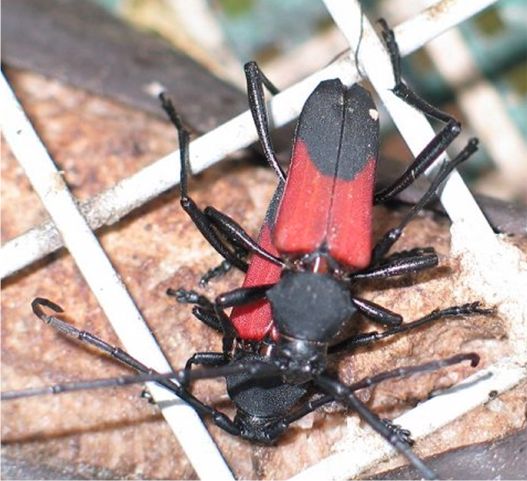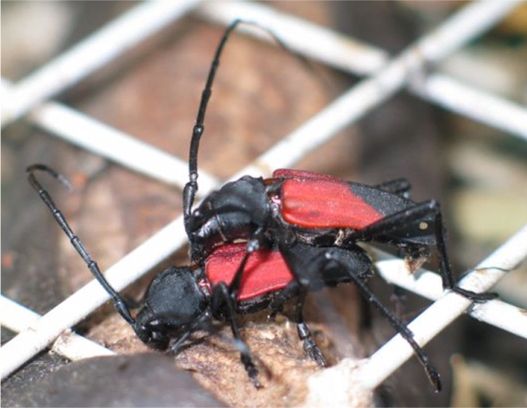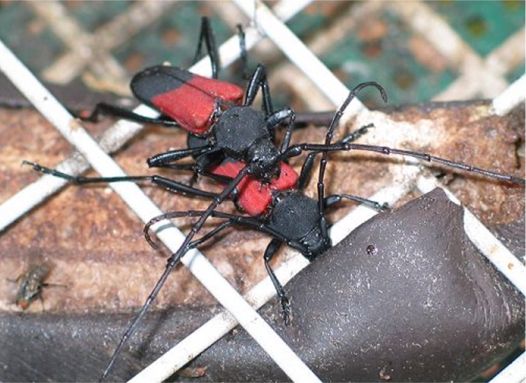
|

|

|
Return to Texas Entomology - Compiled by Mike Quinn

|

|

|
(at banana bait)
Larval Hosts: Larvae feed on hardwoods. (Yanega, 1996)
Adult Biology: Attracted to rotting fruit. (Yanega, 1996)
Similar Species: There are six species of Purpuricenus. (Monné & Hovore, 2005)
axillaris Haldeman 1847 eastern North America dimidiatus LeConte 1884 California humeralis (Fabricius) 1798 eastern North America linsleyi Chemsak 1961 Texas - Primarily north & west of San Antonio opacus (Knull) 1937 Texas - Trans-Pecos paraxillaris MacRae 2000 Texas (primarily east of San Antonio) to Maryland to Florida
Type Specimens:
Purpuricenus axillaris Haldeman, 1847 - Lectotype: J. L. LeConte Collection; sans location data
Purpuricenus dimidiatus LeConte, 1885 - TL: Cal.
Purpuricenus linsleyi Chemsak, 1961 - TL: Tex.
Purpuricenus paraxillaris MacRae, 2000 - TL: MO: Jefferson Co.; Victoria Glade; June 23, 1984; Fermenting Liquid
Etymology: Purpuricenus linsleyi
purpur, -e (L). Purple
linsleyi - Patronym for E. Gortron Linsley
Biography: Earle Gorton Linsley 1910-2000 - University of Nebraska-Lincoln State Museum - Division of Entomology
"Gort Linsley probably is best known entomologically for his contributions to the beetle family Cerambycidae in which he was a world-renown expert. His monumental work, The Cerambycidae of North America, completed in 1977 (with John A. Chemsak) stands as the only such treatise ever attempted for the entire U.S. fauna."
References:
Arnett, R.H., Jr., M.C. Thomas, P. E. Skelley & J.H. Frank. (editors). 2002. American Beetles, Volume II: Polyphaga: Scarabaeoidea through Curculionoidea. CRC Press LLC, Boca Raton, FL. xiv + 861 pp.
Borror, D.J. 1960. Dictionary of Word Roots and Combining Forms. National Press Books, Palo Alto. v + 134 pp.
Chemsak, J. 2000. Earle Gorton Linsley. American Entomologist 46: 270-271.
Dejean, P.F.M.A. 1821. Catalogue de la collection de coléoptères de M. le baron Dejean. Crevot Libr., viii + 136 pp. + 11 pp.
MacRae, T.C. 2000. Review of the genus Purpuricenus Dejean (Coleoptera: Cerambycidae) in North America. Pan-Pacific Entomologist 76: 137-169.
Monné, M.A. & F.T. Hovore. 2005. Electronic Checklist of the Cerambycidae of the Western Hemisphere. 393 pp.
Penrose, R.L. & R.L. Westcott. 1974. Notes on the distribution, hosts and bionomics of some Pacific Northwest Cerambycicae (Coleoptera). The Coleopterists Bulletin, 28(4): 233-236.
Rice, M.E. 1981. Notes on Cerambycidae from Missouri. The Coleopterists Bulletin, 35(4): 459-462.
Solomon, J.D. 1995. Guide to insect borers of North American broadleaf trees and shrubs. USDA Forest Service Handbook 706. Washington, DC. 735 pp.
Yanega, D. 1996. Field guide to northeastern longhorn beetles (Coleoptera: Cerambycidae). Illinois Natural History Survey, Champaign, 6: 1-184.
01 Dec 2008 © Mike Quinn / Texas Entomology / Texas Beetle Information